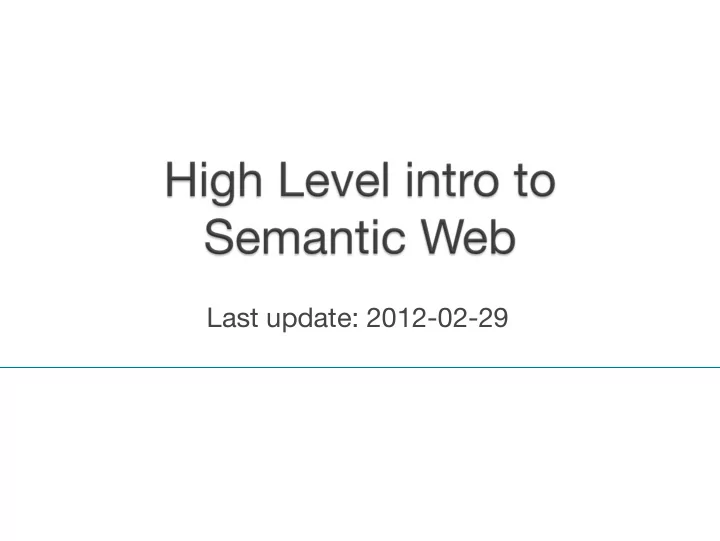

Last update: 2012-02-29
(2)
(3)
The French sister
(7)
A luxury hotel
A cheap alternative
O r a n i c e , i n t e r m e d i a t e s o l u t i o n
(11)
(14)
These are mine… J
} You had to consult a large number of sites, all different in style, purpose, possibly language… } You had to mentally integrate all those information to achieve your goals } We all know that, sometimes, this is a long and tedious process! (19)
} All those pages are only tips of respective icebergs: § the real data is hidden in databases, XML files, Excel sheets, … § you only have access to what the Web page designers allow you to see (20)
} Specialized sites (Expedia, TripAdvisor) do a bit more: § they gather and combine data from other sources (usually with the approval of the data owners) § but they still control how you see those sources } But sometimes you want to personalize: access the original data and combine it yourself! (21)
(22)
} I have to type the same data again and again… } And this is even worse: I feed the icebergs… L (27)
} The raw data should be available on the Web § let the community figure out what applications are possible… (28)
(29)
(31)
} Mashup sites are forced to do very ad-hoc jobs § various data sources expose their data via Web Services, API-s § each with a different API, a different logic, different structure § mashup sites are forced to reinvent the wheel many times because there is no standard way getting to the data! L (32)
} The raw data should be available in a standard way on the Web § i.e., using URI-s to access data § dereferencing that data should lead to something useful (33)
} What makes the current (document) Web work? § people create different documents § they give an address to it (i.e., a URI) and make it accessible to others on the Web (34)
} Others discover the site and they link to it } The more they link to it, the more important and well known the page becomes § remember, this is what, eg, Google exploits! } This is the “Network effect”: some pages become important, and others begin to rely on it even if the author did not expect it… (36)
… d e t c e p x e e b d l u o c s i h T
} The same network effect works on the raw data § Many people link to the data, use it § Much more (and diverse) applications will be created than the “authors” would even dream of! (39)
(40)
(41)
Photo credit “nepatterson”, Flickr
} A “Web” where § documents are available for download on the Internet § but there would be no hyperlinks among them } This is certainly not what we want! (43)
(44)
} The raw data should be available in a standard way on the Web } There should be links among datasets (45)
(46)
Aix-en-Provence on Aix-en-Provence on Wikipedia “Provence and Beyond” (47)
(48)
We want to link the silos! Photo credit “kxlly”, Flickr
(50)
(51)
} On the traditional Web, humans are implicitly taken into account } A Web link has a “context” that a user implicitly uses L (52)
} A human understands that this is where my office is, i.e/, the institution’s home page } He/she knows what it means § realizes that it is a research institute in Amsterdam } But, when handling data, something is missing; machines can’t make sense of the link alone (55)
} New lesson learned: § extra information (“label”) must be added to a link: “this links to my institution, which is a research institute” § this information should be machine readable § this is a characterization (or “classification”) of both the link and its target § in some cases, the classification should allow for some limited “reasoning” (56)
} The raw data should be available in a standard way on the Web } Datasets should be linked } Links, data, sites, should be characterized, classified, etc. } In future: possibility to write and change data… § but that is still further down the line } The result is a Web of Data (57)
(58)
(59)
} It is that simple… } Of course, the devil is in the details § a common data model data has to be provided § the “classification” of the terms can become very complex § data in traditional databases should be reached § but these details are fleshed out by experts as we speak! (60)
} More an more data should be “published” on the Web § this can lead to the “network effect” on data } New breeds of applications come to the fore § “mashups on steroids” § better representation and usage of community knowledge § new customization possibilities § … (61)
Recommend
More recommend